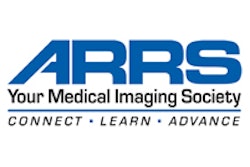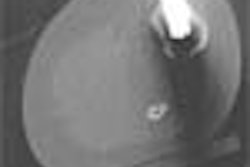A last-minute presentation on the radiological signs of severe acute respiratory syndrome (SARS) was the hot topic at the 2003 American Roentgen Ray Society (ARRS) meeting in San Diego.
Dr. Narinder Paul of Princess Margaret Hospital in Toronto, who offered to present the initial results of his work with SARS just a week before the meeting began, discussed his team’s imaging protocol for tracking the disease.
"For assessing SARS, our aim has been to distinguish it from other community-acquired atypical pneumonia of unknown cause, as well as to exclude other causes," he explained during the special session on May 5.
Paul and colleagues obtained chest radiographs of potential SARS patients with portable x-ray machines in a single view to maintain isolation policies as much as possible. They found that approximately 25% of the SARS patients presented with normal chest x-rays, while the radiographs of the remaining 75% of patients showed unilateral focal opacities, bilateral multifocal opacities, or diffuse opacities.
More than 2,600 people attended this year’s ARRS conference, which ended on May 9. In other meeting highlights:
- Imagers from Indiana University in Indianapolis advocated the routine use of post-toilet imaging for the detection and grading of enteroceles, a common problem found in women who have undergone hysterectomy or bladder neck suspension.
- General radiologists at the University of Arizona in Tucson proved to be as adept as neuroradiologists at reading emergency room head CT scans in the middle of the night.
- MRI of the brains of patients with Alzheimer's disease revealed a high level of water diffusion in some regions, which is similar to the diffusion pattern found in infants and young children, according to investigators from the University of Michigan at Ann Arbor.
- Researchers at Memorial Sloan-Kettering Cancer Center in New York City declared that MRI is preferable to mammography for the annual screening of women at high risk for breast cancer.
- In the hands of a group from Hahnemann University Hospital and Mercy Catholic Medical Center in Philadelphia, FDG-PET demonstrated clear superiority over CT for staging, restaging, and evaluating recurrent breast cancer.
- Radiologists from Bogotá, Colombia reported great success with CT-guided spinal diagnosis and intervention for patients with low back pain. Under CT management, the authors performed a variety of block procedures, such as periradicular infiltrations, facet joint blocks, and nerve root blocks.
- A multi-institutional group discussed a new breast biopsy marking device that is visible on sonography and mammography. The study sought to assess functional characteristics and marker visibility.
- A physician at the M.D. Anderson Cancer Center in Houston shared the institution's FDG-PET protocol for staging or identifying tumors and for distinguishing recurrence from post-treatment changes, as well as monitoring response to therapy.
- A presenter from the University of North Carolina School of Medicine in Chapel Hill offered a mini-course in MR spectroscopy (MRS) of brain tumors. Future directions of MRS include combining metabolite information with the radiation-planning field.
- Investigators from Michigan studied outcome differences between next-day and same-day mammogram readings, and reported a higher positive predictive value (PPV) with the latter.
Finally, in society news, Dr. James Thrall from Massachusetts General Hospital in Boston was named as 2003-2004 president. Dr. Umar Mahmood, Ph.D, also from MGH, was named as the 2003 ARRS scholar for his forthcoming work on molecular biology and imaging. The same scholarship was bestowed on Dr. Aravind Arepally from Johns Hopkins Medical Institutions in Baltimore. He plans to use the award to establish a course in biomedical engineering and interventional MR.
Next year’s ARRS meeting will be held in Miami Beach, FL, from May 2-7, at the Fontainbleau Hotel Resort and Towers. Abstracts for the 2004 papers and exhibits will be accepted at the ARRS Web site from July 1, 2003 to October 3, 2003.
By Shalmali Pal
AuntMinnie.com staff writer
May 21, 2003
Copyright © 2003 AuntMinnie.com



















